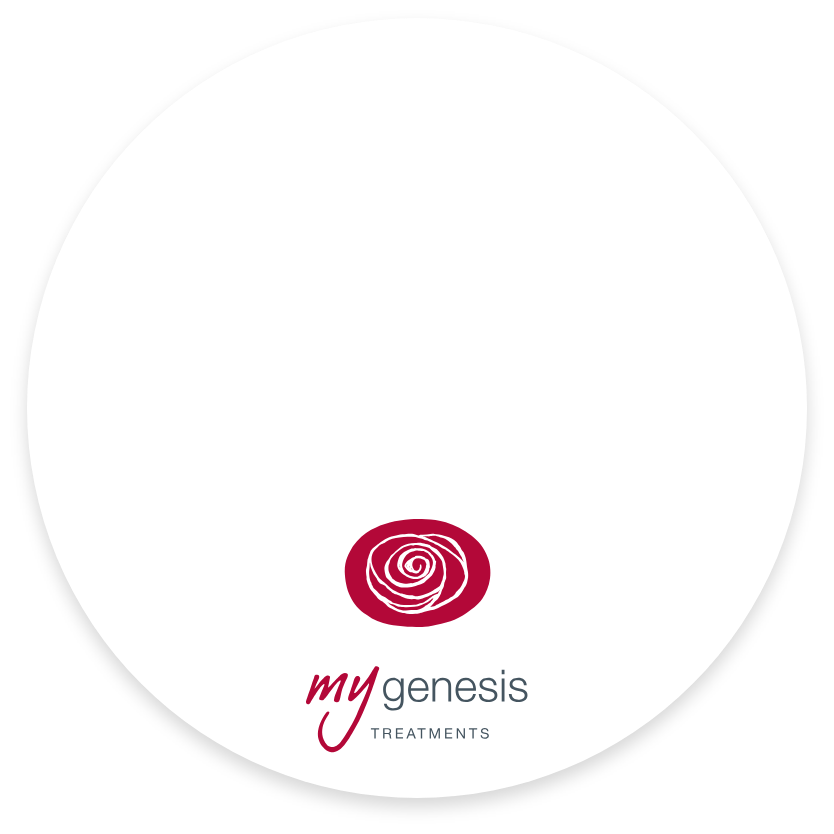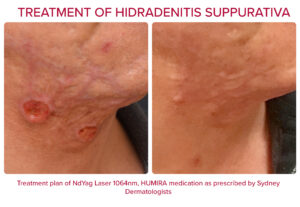
As part of her Dermal Sciences degree, our dermal clinician Brooke has been studying all kinds of debilitating skin conditions. Here’s what she has to say about Hidradenitis Suppurativa, one of the many skin conditions she’s covered in her studies to date:
Hidradenitis suppurativa is a chronic, painful, inflammatory skin condition that results in abscesses, sinus tracts and nodules in one or more areas of the body. This condition usually presents between puberty and 40 years of age [1]. Often this disorder is misdiagnosed due to its presentation and varying degrees associated with the condition. It is estimated that 0.67% of the Australian population were affected by hidradenitis Suppurativa in 2018, with the incidence of women being more than men with a ratio of 3:1. Nutrition, smoking and genetics have shown to be drivers in this condition [2]. There has been research to show ties to other conditions like diabetes mellitus, polycystic ovarian syndrome, inflammatory bowel disease and obesity [3]. Older literature suggests that hidradenitis suppurativa was due to an apocrine gland dysfunction, however, it is now recognised to be a follicular occlusive disease [2].
Histopathology suggests this condition is initiated by an occlusion of a hair follicle in response to hyperkeratinisation which eventuates in a nodule or cyst to form under the skin and then leading to a ruptured follicular epithelium, causing inflammation with sinus and fistula formation and extensive dermal scarring [3].
This chronic skin condition can cause extreme psychological and physical hardship. It can affect the quality of life in most of its sufferers due to its physical appearance, prevalent discharge and painful flareups [2].
The initial occlusion of a hair follicle is found to be associated with hormonal mediators, lifestyle, and our western diet, with diary, sugars and highly refined carbohydrates being drivers. There is research to back the links to gut and the connections to brewer’s yeast, wheat and dairy being drivers in the condition. Elimination of these substances have proven to reduce the flare ups in this condition [1, 3, 4, 5].
Treatments have been researched extensively over the years. More recent studies show that laser therapy can be used for the treatment of this condition. Nd Yag, IPL and CO2 laser have been found to be the most effective [6].
The first line therapies for the treatment of hidradenitis suppurativa include antibiotics, immunosuppressants, hormonal and biological therapies. Surgical intervention is only considered if other treatments do not work initially [7].
Hidradenitis suppurativa is a rare debilitating skin disorder that can affect the quality of life of its sufferers. The links to other inflammatory disorders, smoking, genetics, and diet just shows how complex this disorder is. With inflammatory disorders on the rise, we may start seeing more of this condition in society. With ongoing research, it will bring more knowledge, education, and further advances in treatment outcomes for patients.
B.Worthy
Dermal Clinicians not only treat the skin but can assist and work alongside other professionals to achieve results. The case below is a patient that suffers from HS, and was the inspiration for this assessment. My Genesis used an NdYag laser to treat him over a period of a year whilst he was under the care of his specialists in Sydney. We worked together with his specialists to provide an optimal plan for his recovery and treatment.
Upon seeing this condition, Brooke chose to study this condition further to gain understanding of current evidence-based treatments and recommendations available to assist in the management of this patient. The incredible result of the collaborative treatment can be seen below:

Here is what the patient had to say:
“If you’ve ever felt your concerns have been dismissed. I can confirm that the staff at the CAPS Clinic will listen, and have the professional expertise to help. My experience has been nothing short of life changing.”
High praise indeed! Amazing work, Brooke!!
References:
Our qualified team provide a comprehensive range of treatments for complete skin rejuvenation, cosmetic injectables, laser hair removal and non-surgical body sculpting.